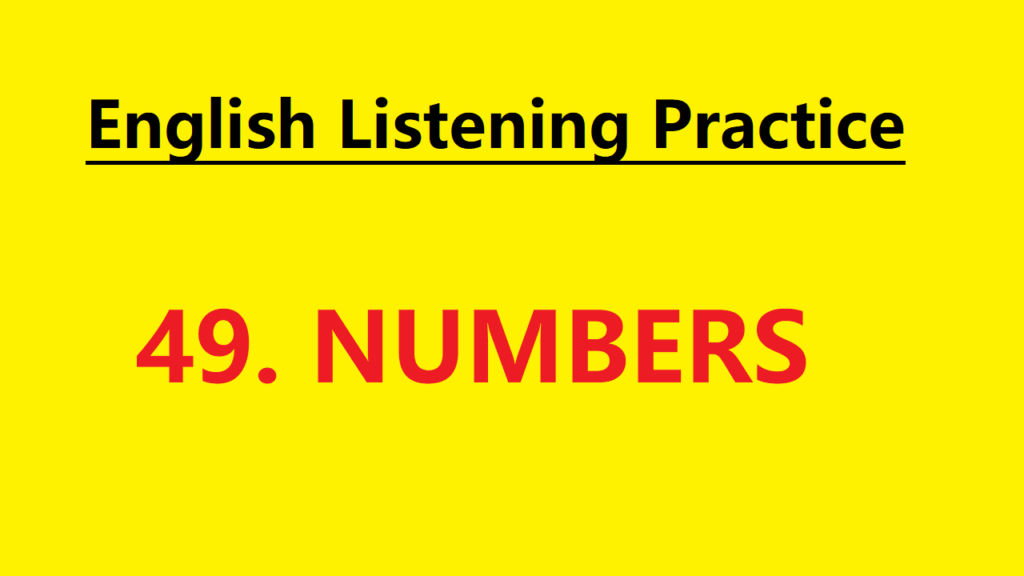Learn to listen and read English through short stories about numbers for beginners. In this video lesson, you will learn easy vocabularies about numbers topic.
Numbers are all around us. They help us in many ways. We use numbers every day. They tell us how many things we have. They help us tell time and measure things. Numbers are important in our lives.
There are different types of numbers. The first type is natural numbers. These are the numbers we use for counting. They start from one and go on forever. One, two, three, four, and so on. We can count apples, cars, and friends with natural numbers.
Next, we have whole numbers. Whole numbers include all natural numbers. They also include zero. Zero is not a natural number, but it is important. We use it to show that we have nothing. For example, if you have zero cookies, you have no cookies at all.
Integers are another type of number. Integers include whole numbers and their negative counterparts. So, integers are -3, -2, -1, 0, 1, 2, and 3. We can use integers when we talk about temperatures. For example, it can be -5 degrees outside.
Rational numbers are numbers that can be written as fractions. They can be whole numbers, integers, or numbers with a decimal. For example, 1/2, 3/4, and 0.5 are all rational numbers. They help us divide things into parts. If you have one pizza and want to share it with a friend, you might cut it into two pieces. Each person gets 1/2 of the pizza.
Another type of number is an irrational number. These are numbers that cannot be written as a simple fraction. They go on forever without repeating. An example is pi (π), which is about 3.14. We use pi in math to calculate circles.
Now, let’s talk about the importance of numbers in our daily lives. We use numbers for telling time. Clocks show us the time using numbers. We have hours and minutes. For example, if the clock shows 3:30, it is half-past three.
Numbers help us with money too. Prices are always written with numbers. If you go shopping, you need to know how much things cost. If a shirt costs $20, you need to have that amount of money. When you pay for something, you count the money.
In school, we learn about numbers in math. Math helps us solve problems. We learn to add, subtract, multiply, and divide. These operations are important for everyday life. For example, if you have three apples and buy two more, you have five apples. This is addition.
Subtraction helps us find out how many we have left. If you eat one apple, you have four apples left. Multiplication is a faster way to add the same number multiple times. For example, if you have five bags with two apples in each bag, you have ten apples.
Division is the opposite of multiplication. It helps us share things equally. If you have ten apples and want to share them with five friends, each person gets two apples.
We also use numbers for measuring. Measuring helps us know the size, weight, or length of something. For example, we use numbers to say that a table is six feet long. A recipe might call for two cups of flour. These measurements use numbers to tell us how much we need.
Numbers are important in science too. Scientists use numbers to collect data. They measure temperature, distance, and weight. For example, if a scientist wants to know how much a rock weighs, they will use a scale with numbers. This helps them compare different rocks.
In sports, numbers are also crucial. Athletes wear jerseys with numbers on them. These numbers help fans identify players. For example, in basketball, the player with number 23 might be the star of the team.
We also use numbers in technology. Computers and phones rely on numbers to function. They use a number system called binary. Binary uses only two numbers: 0 and 1. Everything we see on a screen is made up of these numbers.
Numbers also help us understand data. We see numbers in charts and graphs. They show us information in a simple way. For example, a bar graph can show how many students like chocolate ice cream compared to vanilla.
In our social lives, numbers play a role too. We have phone numbers to connect with friends and family. We also have addresses with numbers to tell us where someone lives. Each house on a street has a unique number.
In summary, numbers are everywhere in our lives. They help us count, measure, and understand the world. We use numbers in math, science, shopping, and daily activities. Numbers are not just symbols; they hold meaning. They help us solve problems and make sense of everything around us.
Understanding numbers is essential. They are a part of our education and daily life. Learning about numbers helps us become better at making decisions. Numbers give us knowledge. They can be fun too! Games and puzzles often use numbers.
So, next time you see a number, think about its importance. Numbers make our world more organized. They help us communicate and share experiences. Embrace the power of numbers!
